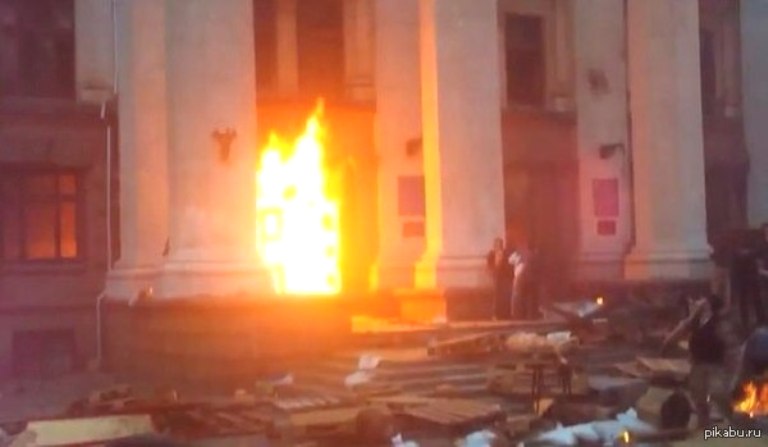
UKRAINE’S ambassador to Germany has provoked outrage for paying homage to the notorious founding forefather of what is known today as the nationalistic ‘Azov’ outfit.
Andriy Melnyk, who appears regularly on international talk shows, described as a national hero of Ukraine Stepan Bandera, who was the World War II-era pro-Nazi leader of the military branch of the the Organisation of Ukrainian Nationalists (OUN-B) which evolved into what is known today as the Azov battalion.
‘Bandera was not a mass murderer of Jews and Poles,’ Melnyk falsely claimed in an interview with German journalist Tilo Jung on Thursday.
He argued that there was no evidence in this regard.
However, ample historical evidence proves Bandera was a Pro-Nazi Germany collaborator and the nationalistic militants under his command were involved in the murders of civilians, Jews and Poles.
Many people in the world share this unfavourable view regarding Bandera.
Poland condemned Melnyk’s comments, calling his praising of Bandera as ‘unacceptable’.
Polish deputy Foreign Minister Marcin Przydacz wrote on a local online platform that ‘such an opinion and such words are absolutely unacceptable’.
Ukraine’s Foreign Ministry quickly moved to distance itself from Melnyk’s comments.
‘The opinion that the Ambassador of Ukraine to Germany Andriy Melnyk expressed in an interview with a German journalist is of his own and does not reflect the position of the Ministry of Foreign Affairs of Ukraine,’ the Foreign Ministry said in a statement late on Thursday night.
It also expressed its gratitude to Poland ‘for its unprecedented support in the fight against Russian aggression’, and emphasised the need for ‘unity in the face of shared challenges’.
Russia launched its ‘special military operation’ in Ukraine on February 24 last year, with the aim to ‘de-militarise’ and to ‘de-Nazify’ the neighbouring country. However, the West has been sending a flood of advanced weapons to Kiev, exacerbating the Russia-Ukraine conflict.
Meanwhile, in Ukraine’s eastern Donbass, which is composed of the two breakaway regions, Donetsk and Lugansk, pro-Russian forces have declared independence.
- A newly-drafted UN Security Council resolution has called on the Israeli regime to ‘immediately and completely’ end its settlement expansion activities across the occupied Palestinian territories, in a fresh blow to the extremist Israeli cabinet’s plots to steal more Palestinian lands.
The resolution was drafted on Thursday ahead of a Security Council meeting on the decades-long Israeli-Palestinian conflict and in response to a recent Israeli announcement that was set to legalise nine outposts and advance plans for some 10,000 new settlement homes in the occupied West Bank.
The draft resolution demanded that Israel ‘immediately and completely cease all settlement activities in the occupied Palestinian territory’.
The resolution ‘reaffirms that the establishment by Israel of settlements in the Palestinian territory occupied since 1967, including East al-Quds (Jerusalem), has no legal validity and constitutes a flagrant violation under international law.’
The draft condemned ‘all Israeli settlement activities and all other unilateral measures aimed at altering the demographic composition, character and status of the Palestinian Territory occupied since 1967, including East al-Quds, including, inter alia, the construction and expansion of settlements, transfer of Israeli settlers, confiscation of land, demolition of homes and displacement of Palestinian civilians.’
Taking Tel Aviv to task for contentious moves aimed at the further occupation of Palestinian territories, including outpost legalisations, the drafted resolution called for ‘upholding unchanged the historic status quo at the holy sites’ in occupied East al-Quds.
It also urged both parties to ‘observe calm and restraint, and to refrain from provocative actions, incitement, inflammatory rhetoric and hate speech’.
The Israeli regime has reportedly okayed the construction of 7,000-plus illegal settler units in the occupied West Bank.
The last time a resolution against Israel on its illegal settlement activities was passed by the Security Council was in December 2016.
Fourteen of the body’s 15 members threw their weight behind the measure while the US, under then-US president Barack Obama, decided to abstain in order to allow the resolution to pass.
The anti-Israel resolution on Thursday was swiftly opposed by the administration of US President Joe Biden, with the State Department labelling as ‘unhelpful’ the push for the UN Security Council to denounce the Israeli move.
‘Steps like settlement activity, steps like the introduction of such a resolution, are unhelpful and put us further away from a negotiated two-state solution,’ deputy State Department spokesperson Vedant Patel told reporters on Thursday.
He said the United States was working with partners at the United Nations in New York on ‘next steps’ which he did not specify.
The United Nations Security Council is scheduled to meet Monday to discuss the Israeli-Palestinian situation, but it remains unclear whether the draft will be presented for a vote, according to UN diplomats.
Tel Aviv has stepped up its efforts at expanding the illegal settlements since late December when Binyamin Netanyahu staged a comeback as the regime’s prime minister at the head of a cabinet of hard-right and ultra-Orthodox parties.
On January 25, Israeli sources said that Netanyahu’s cabinet was planning to increase the number of settler units by a whopping 18,000 in the coming months.
According to a report, the population of Israeli settlers in the occupied West Bank has surpassed 500,000.
More than 600,000 Israelis live in over 230 settlements built since the 1967 Israeli occupation of the West Bank and East al-Quds.
The international community views the settlements – hundreds of which have been built across the West Bank since Tel Aviv’s occupation of the territory in 1967 – as illegal under international law and the Geneva Conventions due to their construction on the occupied territories.
The UN Security Council has condemned Israel’s settlement activities in the occupied territories in several resolutions.
The regime’s unabated construction campaign comes while the Palestinians have historically demanded that the West Bank serve as part of their future state with East al-Quds, which is located inside the territory, as its capital.